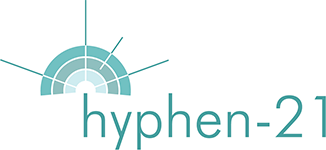T.S. Eliot’s line “humankind cannot bear very much reality” rings true down the centuries and resonates across this web-site. But the more we shrink from our reality, acting in flight from it or denial or defiance of it, the more we fail in our duty and threaten the future of our race and our world.
Hyphen-21 takes the position that in the blur and astonishment of the 21st century, the pressure to deny, dogmatise, detach and atomise becomes ever more intense and is often irresistible. Like gargoyles outside the walls of the temple, many forms of destructive and regressive fundamentalism lie in wait for us, offering the illusion and comfort of escape and certainty and the actuality of further chaos.
At such a time, whatever connects person to person, I to Thou, is a vital matter – firm ground where none other exists. To survive, we have to make precious the space between us.
But in this time of extraordinary flux and danger, new connections and bindings have continually to be found, new ways of making and securing community, and securing the individual within community.
Here is some background material, exploring these thoughts further and offering different ways of explaining the origins, meaning and spirit of Hyphen-21.
The papers entitled “Context” and “A Statement of Aims” were both written in 1998, soon after the charity was formed. Only slightly revised in 2017, they are perhaps more pertinent than ever. The “What is Hyphen-21 ?” paper was written in Autumn 2007 and includes a brief account of the charity’s origins. “Restating the Position”was written in 2012, having first appeared in the Director’s Report. (This last is a legal requirement and is sent annually to Companies House, along with the company’s accounts). Each of the four papers is surprisingly different and singular in its exploration of the meaning and implications of the charity’s position in its time.
The Fables were selected from a larger total written at different times over a period of fifteen years. They seem as relevant now as they did then. Perhaps even more so.
The poem-sets were written at much the same time as the charity itself was conceived and in many ways feel part and parcel of its meaning.
Finally here, I’ll quote the late David Jenkins, from a speech he gave in 1988. He was Bishop of Durham at the time (“the Red Bishop”) and was addressing an audience made up of social workers. In those days too, social work itself felt better founded and more self-confident as an occupation than it has become since. Further, I believe the Bishop’s words apply beyond the social work role to all occupations concerned with social responsibility and care for others :
“Social workers are a group of people who are being called upon to live dangerously at many of the pressure points in our present confused, confusing and increasingly divided society. As such you are the objects of, and therefore presumably in your own persons and reflections the subjects of, a great deal of confusion, anxiety and uncertainty. Your position is highly ambivalent and ambiguous and therefore both actually painful now and potentially promising with regard to the future of our society and, indeed, of human beings on this earth.”
A Context for Hyphen-21, 1998.
The statement that – if we want Community Care to succeed – we need to care for the care workers, has always been a controversial one. If Community Care is a purely material operation concerned with providing services, then how can merely indulging the “shop assistant” benefit the “customer” ?
Download here
More Thoughts on the Principle
“Human life cannot be just a grab for self from birth until death, for me and for mine, my tribe, my possessions, my outward shows, doing and accruing whatever-I-can-get-away-with”
Click here
Reflections 2007 – What is Hyphen-21?
“We need to advance from where we are, with this social expertise that we have learnt ; we have simply no right to carry on retreating.”
Download here
Fable 9
“In all history, have human beings been more isolated, more cut off, more belittled, more fragmented ?”
Download here
Fable 10
“These are difficult times for the people professions. Don’t expect them to behave well. Expect them to lurch about in the storm.”
Download here
Fable 12
“The outcast Jason speaks to an empty agora and compares two cities – the city of illusion and the city of reality. He wonders which to turn to for a secure future and goes in the end for illusion.”
Download here
Fable 14
“In a burning Rome, what is the good citizen to do – clear the in-tray or go out to address the fire ?”
Download here
Fables for Fundamentalists
“ …there are many ways of escaping into a fundamentalist mode of operating, and each one of us will succeed in finding one or another of them several times a day, day after day.”
Download here
Hyphen Poems
A series that explores the notion of the fragile hyphen that connects I to Thou. After a while the hyphen becomes a sort of lonely surf board whizzing about between the waves. At the same time it is the core of everything.
“…To be invincible
you need do nothing
but dance at all times…”
Download here
Shadow Poems
Another series, this time exploring a Jungian concept – the unlived shadow that follows each one of us along the boardwalks. Maybe here is another connection that needs to be improved before I-Thou can flourish. Better I-Thou may mean a better connection with our own unnamed fears.
“…My shadow seethes with strange life.
When I walk it dwarfs me.
When I sleep it engulfs me…”
Download here
Keeping Station
This is a short poem that picks up on a few ideas of David Jenkins, ex-Bishop of Durham. He proposes “Communities of Endurance” as a coping mechanism in stormy weather.
“…The keeping station,
the holding on,
goes better when you’re not alone.”
Download here
